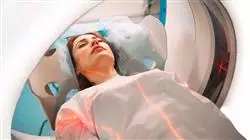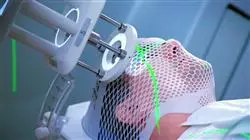University certificate
The world's largest faculty of engineering”
Why study at TECH?
This Postgraduate diploma will immerse you in radiological phenomena, the development of three-dimensional treatments and the application of cutting-edge technologies. Don't waste time, enroll now!"

Radiophysics Applied to Advanced Radiotherapy Procedures represents an innovative field that fuses medical radiotherapy with engineering, generating significant benefits in the treatment of oncological diseases. Thanks to Applied Radiophysics, advanced customization of treatments is achieved, considering the specific anatomical and biological characteristics of each patient. In addition, the application of more sophisticated imaging and dosimetry techniques allows for greater accuracy in radiation administration, minimizing adverse effects on surrounding tissues.
This way, this Postgraduate diploma was born, which will address crucial aspects such as Protonterapia, a consolidated technique that uses protons to reduce radiation in healthy tissues during the treatment of Cancer. In addition, the program will analyze the interaction of protons with matter, cutting-edge technology and clinical aspects, including radiation protection.
Also, Intraoperative Radiotherapy will be investigated, consisting of highly precise treatments during surgery, analyzing innovative technology, dose calculations and safety. Finally, the graduates will delve into the physical and biological foundations of brachytherapy, addressing sources of radiation, clinical applications and ethical dilemmas. This will allow professionals to contribute to both practical and investigative development in radiophysics.
This university program offers complete training, with teaching resources developed through the innovative methodology Relearning, pioneer in TECH. This technique involves strategic repetition of essential concepts, to ensure a thorough understanding of the material. In addition, being completely online, the platform will be available 24 hours a day, being able to access from any electronic device with an Internet connection. This eliminates the need to move or adjust to established schedules, providing total flexibility.
With this 100% online program you will master the most innovative procedures, such as the Flash Technique, the latest trend in Intraoperative Radiotherapy"
This Postgraduate diploma in Radiophysics Applied to Advanced Radiotherapy Procedures contains the most complete and up-to-date program on the market. Its most notable features are:
- The development of practical cases presented by experts in Radiophysics Applied to Advanced Radiotherapy Procedures
- The graphic, schematic, and practical contents with which they are created, provide scientific and practical information on the disciplines that are essential for professional practice
- Practical exercises where the self-assessment process can be carried out to improve learning
- Its special emphasis on innovative methodologies
- Theoretical lessons, questions to the expert, debate forums on controversial topics, and individual reflection assignments
- Content that is accessible from any fixed or portable device with an Internet connection
You will delve into Intraoperative Radiation Therapy, an approach involving the application of radiation during surgical procedures, focusing on technical and clinical details for a complete understanding"
The program’s teaching staff includes professionals from the field who contribute their work experience to this educational program, as well as renowned specialists from leading societies and prestigious universities.
The multimedia content, developed with the latest educational technology, will provide the professional with situated and contextual learning, i.e., a simulated environment that will provide immersive education programmed to learn in real situations.
This program is designed around Problem-Based Learning, whereby the professional must try to solve the different professional practice situations that arise during the academic year For this purpose, the students will be assisted by an innovative interactive video system created by renowned and experienced experts.
You will analyze the physical and practical principles of Protonterapia through the wide variety of multimedia resources available on the TECH platform"

Bet on TECH! You will immerse yourself in the techniques of implantation of brachytherapy, involving the placement of radioactive sources directly in the patient’s body"
Syllabus
This academic qualification has been carefully designed to promote professional advancement and excellence in the practice of radiotherapy. Its design is based on an innovative and comprehensive syllabus, where three essential areas converge: Protonterapia, Intraoperative Radiation Therapy and Brachytherapy. From studying the interaction of protons with matter, to practical application in clinical environments and precise dose management, the content will equip engineers to lead evolution in this field.

Boost your professional career! You will gain the necessary tools and confidence to contribute significantly to the field of Radiotherapy"
Module 1. Advanced Radiotherapy Method. Proton Therapy
1.1. Proton Therapy Proton Radiotherapy
1.1.1. Interaction of Protons with Matter
1.1.2. Clinical Aspects of Proton Therapy
1.1.3. Physical and Radiobiological Basis of Proton Therapy
1.2. Equipment in Protontherapy
1.2.1. Facilities
1.2.2. Components of a Protontherapy System
1.2.3. Physical and Radiobiological Basis of Proton Therapy
1.3. Proton Beam
1.3.1. Parameters
1.3.2. Clinical Implications
1.3.3. Application in Oncological Treatments
1.4. Physical Dosimetry in Proton Therapy
1.4.1. Absolute Dosimetry Measurements
1.4.2. Beam Parameters
1.4.3. Materials in Physical Dosimetry
1.5. Clinical Dosimetry in Proton Therapy
1.5.1. Application of Clinical Dosimetry in Proton Therapy
1.5.2. Planning and Calculation Algorithms
1.5.3. Imaging Systems
1.6. Radiological Protection in Proton Therapy
1.6.1. Design of an Installation
1.6.2. Neutron Production and Activation
1.6.3. Activation
1.7. Proton Therapy Treatments
1.7.1. Image-Guided Treatment
1.7.2. In Vivo Treatment Verification
1.7.3. BOLUS Usage
1.8. Biological Effects of Proton Therapy
1.8.1. Physical Aspects
1.8.2. Radiobiology
1.8.3. Dosimetric Implications
1.9. Measuring Equipment in Proton Therapy
1.9.1. Dosimetric Equipment
1.9.2. Radiation Protection Equipment
1.9.3. Personal Dosimetry
1.10. Uncertainties in Proton Therapy
1.10.1. Uncertainties Associated with Physical Concepts
1.10.2. Uncertainties Associated with the Therapeutic Process
1.10.3. Advances in Protontherapy
Module 2. Advanced Radiotherapy Method. Intraoperative Radiotherapy
2.1. Intraoperative Radiotherapy
2.1.1. Intraoperative Radiotherapy
2.1.2. Current Approach to Intraoperative Radiotherapy
2.1.3. Intraoperative Radiotherapy versus Conventional Radiotherapy
2.2. Technology in Intraoperative Radiotherapy
2.2.1. Mobile Linear Accelerators in Intraoperative Radiotherapy
2.2.2. Intraoperative Imaging Systems
2.2.3. Quality Control and Maintenance of Equipment
2.3. Treatment Planning in Intraoperative Radiation Therapy
2.3.1. Dose Calculation Methods
2.3.2. Volumetry and Delineation of Organs at Risk
2.3.3. Dose Optimization and Fractionation
2.4. Clinical Indications and Patient Selection for Intraoperative Radiation Therapy
2.4.1. Types of Cancers Treated with Intraoperative Radiotherapy
2.4.2. Assessment of Patient Suitability
2.4.3. Clinical Studies and Discussion
2.5. Surgical Procedures in Intraoperative Radiotherapy
2.5.1. Surgical Preparation and Logistics
2.5.2. Radiation Administration Techniques During Surgery
2.5.3. Postoperative Follow-Up and Patient Care
2.6. Calculation and Administration of Radiation Dose for Intraoperative Radiotherapy
2.6.1. Dose Calculation Formulas and Algorithms
2.6.2. Correction Factors and Dose Adjustment
2.6.3. Real-Time Monitoring during Surgery
2.7. Radiation Protection and Safety in Intraoperative Radiotherapy
2.7.1. International Radiation Protection Standards and Regulations
2.7.2. Safety Measures for the Medical Staff and the Patient
2.7.3. Risk Mitigation Strategies
2.8. Interdisciplinary Collaboration in Intraoperative Radiation Therapy
2.8.1. Role of the Multidisciplinary Team in Intraoperative Radiotherapy
2.8.2. Communication between Radiotherapists, Surgeons and Oncologists
2.8.3. Practical Examples of Interdisciplinary Collaboration
2.9. Flash Technique. Latest Trend in Intraoperative Radiation Therapy
2.9.1. Research and Development in Intraoperative Radiation Therapy
2.9.2. New Technologies and Emerging Therapies in Intraoperative Radiotherapy
2.9.3. Implications for Future Clinical Practice
2.10. Ethics and Social Aspects in Intraoperative Radiation Therapy
2.10.1. Ethical Considerations in Clinical Decision-Making
2.10.2. Access to Intraoperative Radiation Therapy and Equity of Care
2.10.3. Communication with Patients and Families in Complex Situations
Module 3. Brachytherapy in the Field of Radiotherapy
3.1. Brachytherapy
3.1.1. Physical Principles of Brachytherapy
3.1.2. Biological Principles and Radiobiology applied to Brachytherapy
3.1.3. Brachytherapy and External Radiotherapy. Differences
3.2. Radiation Sources in Brachytherapy
3.2.1. Radiation Sources used in Brachytherapy
3.2.2. Radiation Emission of the Sources used in Brachytherapy
3.2.3. Calibration of the Sources
3.2.4. Safety in the Handling and Storage of Brachytherapy Sources
3.3. Dose Planning in Brachytherapy
3.3.1. Dose Planning Techniques in Brachytherapy
3.3.2. Optimization of the Dose Distribution in the Target Tissue
3.3.3. Application of the Monte Carlo Method
3.3.4. Specific Considerations for Minimizing Irradiation of Healthy Tissue
3.3.5. TG 43 Formalism
3.4. Administration Techniques in Brachytherapy
3.4.1. High Dose Rate Brachytherapy (HDR) versus Low Dose Rate Brachytherapy (LDR)
3.4.2. Clinical Procedures and Treatment Logistics
3.4.3. Management of Devices and Catheters used in the Administration of Brachytherapy
3.5. Clinical Indications for Brachytherapy
3.5.1. Brachytherapy Applications in the Treatment of Prostate Cancer
3.5.2. Brachytherapy in Cervical Cancer: Technique and Results
3.5.3. Brachytherapy in Breast Cancer: Clinical Considerations and Results
3.6. Quality Management in Brachytherapy
3.6.1. Specific Quality Management Protocols for Brachytherapy
3.6.2. Quality Control of Equipment and Treatment Systems
3.6.3. Audit and Compliance with Regulatory Standards
3.7. Clinical Results in Brachytherapy
3.7.1. Review of Clinical Studies and Results in the Treatment of Specific Cancers
3.7.2. Evaluation of the Efficacy and Toxicity of Brachytherapy
3.7.3. Clinical Cases and Discussion of Results
3.8. Ethics and International Regulatory Aspects in Brachytherapy
3.8.1. Ethical Issues in Shared Decision-Making with Patients
3.8.2. Compliance with International Radiation Safety Standards and Regulations
3.8.3. International Liability and Legal Aspects in Brachytherapy Practice of Brachytherapy
3.9. Technological Development in Brachytherapy
3.9.1. Technological Innovations in the Field of Brachytherapy
3.9.2. Research and Development of New Techniques and Devices in Brachytherapy
3.9.3. Interdisciplinary Collaboration in Brachytherapy Research Projects
3.10. Practical Application and Simulations in Brachytherapy
3.10.1. Clinical Simulation of Brachytherapy
3.10.2. Resolution of Practical Situations and Technical Challenges
3.10.3. Evaluation of Treatment Plans and Discussion of Results

Lead the revolution in the field of radiation therapy! Thanks to the 100% online mode, you can manage your study time according to your personal needs"
Postgraduate Diploma in Radiophysics Applied to Advanced Radiotherapy Procedures
Discover an innovative path to leadership in the field of medical engineering with TECH Global University's Postgraduate Diploma in Radiophysics Applied to Advanced Radiotherapy Procedures. This exceptional postgraduate program is designed for professionals looking to excel in the exciting field of radiation therapy, exploring the most advanced procedures and emerging technologies in oncology treatment. Our institution is proud to offer this unique program that seamlessly combines educational excellence with the flexibility of online classes. This online modality not only allows you to access the content from anywhere in the world, but also adapts to your schedule, allowing you to advance your education without sacrificing your professional and personal responsibilities.
Update your knowledge in the field of radiophysics with this online postgraduate diploma
In the Postgraduate Diploma in Radiophysics Applied to Advanced Radiotherapy Procedures, you will explore the latest innovations in radiotherapeutic dosimetry, applied technology in oncology treatments and specialized radiotherapy equipment. Our program is designed to provide you with practical and specialized knowledge that is essential in today's industry. TECH Global University's faculty is made up of experts and leaders in the field of radiotherapy who will share their knowledge and experience, giving you a unique perspective on the advanced procedures and emerging technologies that are shaping the future of radiotherapy. Upon graduation from the Postgraduate Diploma, taught by the Faculty of Engineering, you will not only earn a diploma, but you will be prepared to lead in the practical application of Radiophysics in oncology treatment, contributing to the advancement of medical engineering and the continuous improvement of oncology care. Take the next step in your professional career and immerse yourself in this unique program with TECH Global University. Improve your skills, boost your career and be part of the cutting edge in radiotherapy applied to advanced procedures.







